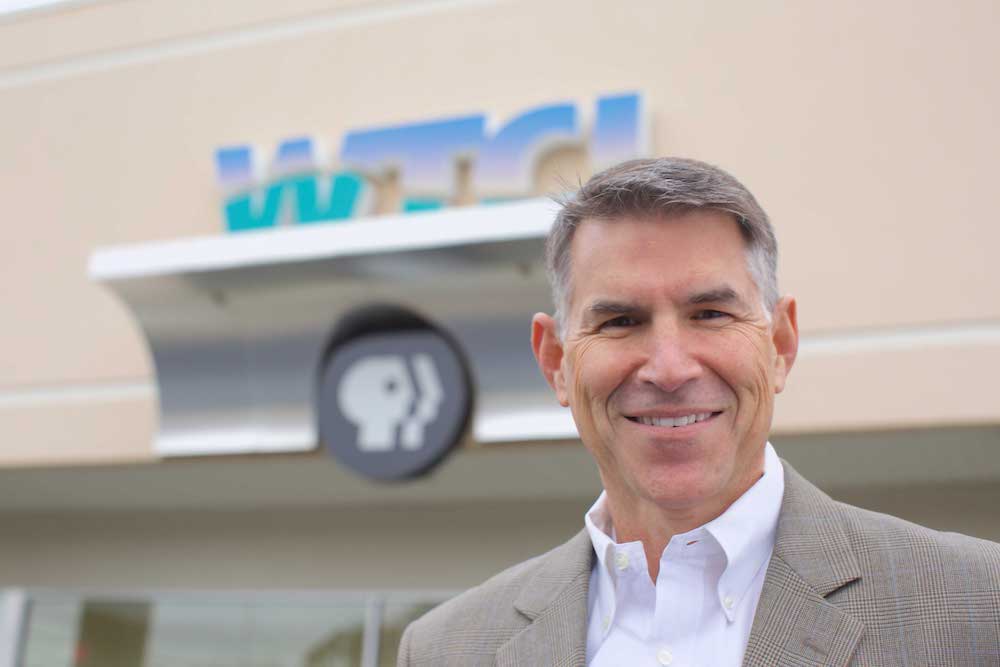‘Marketplace’ reporter fired after post questioning objectivity in journalism
A Marketplace reporter says he was fired Monday after republishing a post on Medium that questioned whether journalists should drop traditional standards for neutrality.
In his Jan. 25 commentary, “Objectivity is dead, and I’m okay with it,” Lewis Wallace described his internal conflicts over his role as a reporter and his dignity as a transgender person under the new administration. He never explicitly names President Trump or White House officials who have discredited critical media coverage, yet refers to statements in the early days of the Trump presidency. He wrote:
“As a working journalist, I’ve been deeply questioning not just what our role is in this moment, but how we must change what we are doing to adapt to a government that believes in ‘alternative facts’ and thrives on lies, including the lie of white racial superiority.”
Wallace went on to make the case that neutrality “isn’t real” and asked other journalists for their reactions.
Sharing his own perspective as a transgender person, he said, “I can’t be neutral or centrist in a debate over my own humanity. The idea that I don’t have a right to exist is not an opinion, it is a falsehood. On that note, can people of color be expected to give credence to ‘both sides’ of a dispute with a white supremacist, a person who holds unscientific and morally reprehensible views on the very nature of being human? Should any of us do that?”
But, in a subsequent Medium post describing how his critique of journalistic objectivity led to his dismissal, Wallace recounted how he removed the post at the request of his supervisors. They told him he had violated Marketplace’s ethics code and would be suspended for the rest of the week.
Wallace later reconsidered his decision to withdraw the commentary, and informed his bosses last Friday in a letter that he planned to republish it.
He did so, and learned Monday morning that he’d been fired.
Wallace, who worked in Marketplace’s New York bureau, was a Pritzker Journalism Fellow at Chicago’s WBEZ, a training program to promote diversity in public radio newsrooms. He also received fellowships for environmental reporting and AIR’s New Voices program. He reported for WYSO in Yellow Springs, Ohio, before joining Marketplace.
In his second Medium post, Wallace wrote that he was the Marketplace’s only transgender reporter and, as far as he knew, the only transgender person “at any national radio outlet.”
‘Keep political views private’
In his account of the dismissal, Wallace was told he had violated Marketplace’s standards for objectivity and neutrality. His supervisors pointed to this statement in his original post: “We will be called politically correct, liberal and leftist. We shouldn’t care about that nor work to avoid it.”
Marketplace’s ethics code does not specifically use the terms “objective” or “neutral,” but its guidelines for social media say: “We should do nothing that could undermine our credibility with the public, damage our newsroom’s standing as an impartial source of news or otherwise jeopardize Marketplace’s reputation. … We’ll conduct ourselves in social media forums fully aware of how our behavior or comments might appear if we were called upon to defend them as a news organization.”
The “public life” section of the code says “Marketplace staffers must keep their political views private.”
In the Jan. 31 post about his firing, Wallace said public media’s standards for newsroom diversity and objective reporting are in conflict. “We cannot have token diversity without making actual space for the realities of being a marginalized or oppressed person doing journalism,” he said.
Wallace wrote that he had been encouraged to use social media to build his “personal brand” as a Marketplace journalist. In an email with Current, he said he had never been questioned on the ethics of his journalism. When he wrote his original commentary about objectivity, he said, “it didn’t even occur to me that I should worry about a sort of high-level post about journalistic ethics in that regard.”
In a forthcoming interview for The Pub, Wallace describes why he decided to go public with his account, saying he wanted to “raise these broader questions about how we find our direction as journalists in this rapidly changing world and how we make space for different kinds of voices and different kinds of stories.”
“My priority in deciding to be public about this conversation is not to disparage Marketplace or encourage people to pass judgment on the work of the other people who work there, because I think they are to a person really talented and wonderful,” he said.
APM declined to confirm Wallace’s account of his dismissal, citing a policy not to discuss personnel matters. In a statement, spokesperson Angie Andresen said: “Our strong ethics and political activity guidelines are clear and are designed to allow us to fulfill our commitment to independent and objective reporting. Diversity is a hallmark and strength of Marketplace’s staff.”







he said he had never been questioned on the ethics of his journalism.
Well you have now, and you failed.
Nope, he hasn’t been questioned on the ethics of his journalism. He’s been questioned on the ethics of the essay he wrote about journalism. A subtle but important distinction.
I guess.
He has been questioned on violating the ethics code of his employer–its very clear social media policy in particular:
“1. Fairness, balance and perception: We should do nothing that could undermine our credibility with the public, damage our newsroom’s standing as an impartial source of news or otherwise jeopardize MPR News’ reputation.”
I’d say that a reporter’s declaration that “objectivity is dead” COULD (notice the language in the ethics policy) “damage the newsroom’s standing as an impartial source.”
“The “public life” section of the code says “Marketplace staffers must keep their political views private.””
Public radio management and personnel still believe their listeners are too dumb to discern what their political views are.
I don’t understand why everyone is only looking at policies of Marketplace. It is under APM, which is under Minnesota Public Radio–and they have a very clear social media policy with a commitment to impartiality:
“1. Fairness, balance and perception: We should do nothing that could undermine our credibility with the public, damage our newsroom’s standing as an impartial source of news or otherwise jeopardize MPR News’ reputation.”
Wallace asks, “Can people of color be expected to give credence to ‘both sides’ of a dispute with a white supremacist, a person who holds unscientific and morally reprehensible views on the very nature of being human?”
Evidently, Marketplace’s answer is: Yes, it is more important for the public to hear the voices of actual fascists than to have a discussion about whether that is an appropriate way to do journalism.
We want more diversity on public media. More than ever, against Trump’s actions to defund public media. https://uploads.disquscdn.com/images/1cc559c862253a6b0bb121ceca3dc3fb1dd00eee3205a0480f8839669bb2d888.jpg WXXI
This ethical battle of nuance and self reflection is eternal. Here we seem to be drifting into Meta land. How to report the news without becoming the news? When is it appropriate to cross that line? Raise an issue to the public that’s very ‘insider’ and elevate it to a hall of mirrors level?
First, we all know- or would come quickly to assume anyone who works for a news organization 1) likes the news, 2) is somewhat sympathetic with the outlets political hue. And is human, therefor 3) every reporter that has worked for a news institution has issues with their boss, the System.
Integrity is how you react to that hard reality. Most usually bite their lip and suck it up, or leave and tell their side. Every format is imperfect and offends/chafes insiders in different ways for different reasons. One obvious example: all school teachers who have eternally had to teach basic guidelines of whats given to them, throughout history all the black, latino, Asian, homosexual (etc!) teachers who know there’s more history left out than included in the age old established basics… they know the other side when they stand as an authority in front of those young minds. But can’t spend the bulk of their time exposing it all, adding their version, criticisms.. because upending the System before the framework is taught is like buying swiss cheese for the holes. Similarly for the soldier in the military, or an athelete on a professional sports team, the cop on the police force. Annoying but apropos here is the old saying ‘You have to learn the rules before you break them’.
Marketplace are not at the exceptionally critical level where this Meta issue needs public airing, where say, insider corruption so heavy it threatens the very host, or more relevent- if so apolitical and blind to the rapidly developing anti-Democratic political tone which we all know at the top is unfathomably hard right rooted. It is in growth phase, delicately balancing reporting with the daily truths we all see and hear today, from many kin Public media sources.
It is reporting broad, general stories in what appears a fair, factual, thoughtful way. What’s left out is always a question- but while interesting, how the individual reporters feel about it isn’t that relevant to the story we hear on the short aired daily show. We know its imperfect. We know about issues with diversity and attempts to branch out-whether difficult, clumsy, smooth, and we know reporting the views of the worst of the worst, racists and fascist sympathizers though soul destroying, is necessary, painful and the point of journalism at its core. To offer the information, uneditorialized. To trust the audience to figure out what it means on their own.
Can people of colour- including ‘white’, be trusted and expected to fairly report opinions of those with seemingly opposite views? Yes. Hard as hell to grin and bear it, to feel any empathy or compassion for your spiritual ‘enemy’.. but at least, while perhaps imperfect, they’re trying. Not trying would be of more concern.
Getting lost in the Meta woods of the topic raised is coming at the worst time, when growth is key not in fighting or making a molehilk into a mountain, and a grievance aired in an unprofessional way. Basically: If one works for Marketplace, the focus should be on it, not tearing it down with vocal self criticism.
If you don’t like it, as they say, you can make your own. There’s an idea- but whoever you work with, consider the possibility of criticism and losing site of the big picture. ((Irony alert)).
When I was involved in the Occupy movement in 2011, NPR made a big stink out of it, blacklisted me, and trashed my reputation, even though I was not an NPR employee, not working as an NPR contracter, not receiving a dime from NPR. But they used me to score cheap political points. “Look at us! We’re getting rid of big scary leftist woman!” Even though they couldn’t get rid of me because I didn’t work there. But they wanted people to think they did.
Meanwhile, actual NPR employees have major, irrefutable conflicts of interest. But hypocrisy is coin of the realm, and NPR is evidently proud of it.
Meanwhile, actual NPR employees have major, irrefutable conflicts of interest.
Examples?
Scott Simon has written op-eds advocating a political point of view — i.e., that the U.S. should go to war with Afghanistan after 9/11, which he also espoused in a speech to an audience at a public radio event — and he continues to advocate political positions on Weekend Edition Saturday. Cokie Roberts, Adam Davidson, and other NPR employees have accepted speaking fees of tens of thousands of dollars from corporations while continuing to report the news. Mara Liasson spent years flacking for Fox TV while being a reporter for NPR.
I’d say those are major conflicts of interest.
So by your definition corporations are all bad and taking a fee for speaking is a no no? Scott gave a speech on his own, (which topically isn’t important here, though I have differing opinion to some of his his views, as you obviously do) where he represented himself and after many years in his field has earned the right to talk about it. Its curious why that’s an ethical issue. And if you just don’t like him, well that will seriously obscure your view of what he does. Set that bias aside. (It takes practice, but try).
Should NPR folk work for free? If you afirm yes, why? Would you if you worked for years pouring yourself into the cause? If anything they should be paid as much as any high profile celeb or politician given their experience is relevant and directly serves the public for a job which is inherently good and very necessary. And often pays crap for it. I think teachers, cops, firefighters, and soldiers should be paid more too- though have a higher minimum education standards set before joining. Crazy notions paying socially valuable what they’re worth huh?
I tried to find your reply worthy of sympathy, and the only segment which earned it was the mention of Mara Liasson having worked with Fox. But I recognize my knee jerk irritation is my own bias- I know better than to judge those former Fox folk because often, some people had to take what jobs were open out of school, were in a region where that’s normal and as we all know Fox will hire anyone. Why not do hack work to earn a buck for a short spell, keep your mouth shut and pay off the bills while seeing how Murdochs weirdo world runs? It will mean more when you leave it for greener pastures and can appreciate the balance, can speak with authority how a closed, old fashioned, patriarchal system runs. Alternately, maybe she chose it, liked it and is doing just that ‘grin and bear ‘ it routine with NPR now. Her views are her own, and I don’t get any nasty vibes so don’t see why she also gets dumped on by you.
If your pov is NPR has a conflict of interest, ask yourself why you or anyone should spend precious time criticizing them of all people, when they’re obviously doing as well as they can, on tight budgets and time and are not super heroes that we need to see self flagellating to make them appear more pious and untouchable in your eyes while elevating temselves needlessly to Saintly status. They’re faulty, human, real and often self critique- and manage to do what they do which is extraordinary work on a daily routine, without scandal, drama or deception. And they apologize when thry get it wrong. Even tiny things. Personally I love the flaws and quirks.
For those who criticize NPR with ease seeing a conflict of interest angle, instead consider turning your icy stare to those who deserve scorn and scrutiny, the many do gooder ‘liberal’ profiteering non-profits, with 85% overhead and over paid executive staff. Paltry results and too many sanctimonious/cool tv commercials and print ads scream “investigate me!”. The words Pink and Cancer come to mind… as does WWF. Watchdog groups exist for a reason.
And howabout $500-10,000 a plate campaign fundraisers, half a million spent on pr and luxury food catering for pet cause ‘liberal’ galas, or how ‘liberal Hollywood’ tv producers continue to churn out garbage and hire awful hack writers which perpetuate disgusting, ugly Middle Eastern and muslim stereotypes. All that money yet they don’t travel apoarently or see reality right here in America.
Liberals need the mirror held up at them as much as we aim it at the worst offenders in society, often on the right but not always, but when it comes to starting with shredding NPR, seriously wtf. You got issues. Deal with it.
Wow. Your comment is so full of logical fallacies and false statements it’s hard to know where to begin. Not to mention it’s prolix beyond measure. I’ll address some of your nonsense but have neither the time nor the interest for all of it. Life is too short.
“Now, by your reply above, corporations are all bad.”
Inane statement. I never said any such thing.
“taking a fee for speaking is a no no.”
That’s right, according to NPR’s own code of ethics, not to mention common sense. If you’re taking money from Corporation X, you can’t then report on Corporation X and pretend to be objective. It’s an inherent conflict of interest. A 6th grader could tell you that.
NPR’s code of ethics also dictates that an NPR news reporter/editor/producer/host cannot advocate for political causes, which is precisely what Scott Simon did in his Wall Street Journal op-ed and public speech, both urging the U.S. to go to war. Again, consult a 6th grader if need be for clarification.
“Should NPR folk work for free?”
What in God’s name are you talking about?? NPR employees are paid, and paid well, especially hosts. Why would they work for free?
“When it comes to starting with shredding NPR, seriously wtf. You got issues. Deal with it.”
Well, there’s a statement for the ages. Very impressive.
So it’s still throwing the baby out with the.. essentially you loathe all of NPR for their crime of keeping Scott on. And distancing themselves from you.
Conflicts aside (which we reader/listeners can parse) and it’s still not made clear he was paid by the very same evil corporation he reported on (and yes, though it goes against basic protocol, a reporter worth their salt can be objective report fairly on their p/t benefactor), how much he made, was it repeatedly or one time, was he sufficiently scolded by the boss lady for it, was anyone else from NPR paid for delivering similar ‘ethic-breaching’ speeches? Serious Qs, not snark.
For the record I certainly don’t like blatent bias either, so we agree on your core complaint. Consider though, delicate context of his weight with the organization then, still growing, who perhaps at that time they simply chose to strike a deal with the mild mannered devil, opting to overlook his gross stance for the then necessary greater good. Insiders would know best on such details. Lets wait for the NPR tell all!
Regardless, one can freelance while being attached to an institution, though often only senior members are given great leeway when the work becomes controversial. I recall Scott’s pro-invade editorial backlash. He wasn’t totally given a pass but there were simply more important things to concentrate on.
I asked whether you (not related to NPR rules) thought in broad terms if a qualified, respected reporter shouldn’t be paid for giving a speech, in the freelance context and if so why not- you wanted to shame that, seemed to shame seasoned reporters for doing the same. It’s a philosophic issue I’ve thought on for years, and such rules may be outgrowing that old framework. Boils down to: Should a paid professional never publically discuss their craft? Or only do so for free? Or be paid as a ‘consultant’ to call it another name so it feels better?
Most importantly in regards to NPR people you named do you know the context of their speeches, had they espoused personal political beliefs or were generally discussing reporting of the news, methodology, pitfalls of political journalism, etc? Here’s where nuance matters, akin to telling a racist joke vs telling a story about someone telling a racist joke. Or satirizing a racist.
On the pay issue many NPR long timers are underpaid compared to their professional peers for time put in, geographical living costs, and interns do often work essentially for free, (not that I said they did or should when I asked your .02 before). That $200ish weekly stipend doesn’t go far. College sports, art galleries and banks do the same yet all can afford it. Intern pay, feh! Talk about ethically repugnant.
Anthow, sorry to have come on so strong initially but you do have a chip on your shoulder about NPR, which is sad and rather unfair to the hundreds of non-Scott folk doing amazing work. They already take enough sh*t from the right or ignorant uninformed, uncurious types, it raises my hackles to see good people attacked by what seems to be someone who should know better. That’s all.
Another tome. Meh. Didn’t feel up to endless editing.
Inane.
Marketplace, as part of APM, must abide by the ethics policy outlined by Minnesota Public Radio. To quote the very first point of MPR’s social media policy:
“1. Fairness, balance and perception: We should do nothing that could undermine our credibility with the public, damage our newsroom’s standing as an impartial source of news or otherwise jeopardize MPR News’ reputation.”
I’d say that a reporter’s declaration that “objectivity is dead” COULD (notice the language in the ethics policy) “damage the newsroom’s standing as an impartial source.”
If a journalist does not think he or she can be objective or impartial, there are many outfits with a similar outlook–from the National Review to Democracy Now. Why work at a place with an ethics policy that conflicts with their personal approach to journalism?
I always thought that journalism (the activity or profession of writing for newspapers, magazines, or news websites or preparing news to be broadcast) was simply reporting the news (newly received or noteworthy information, especially about recent or important events.)
But journalism has slowly moved toward “Opinionism” over the years as news shows have gone from 30 minutes to all day.
We, as taxpayers, cannot support public news venues if they allow bias because it may not support all taxpayer’s opinions. Therefore, writers that need to express their opinions do not belong in that forum. I applaud NPR’s decision to fire Mr. Wallace because he was ruining its reputation as a reliable news source.
If Mr. Wallace had any integrity, he would have resigned and would have gone to work for an “Opinionism” or “Yellow Journalism”,(The use of cheaply sensational or unscrupulous methods in newspapers to attract and influence the readers.), outlet where he could express his overtly bias views.